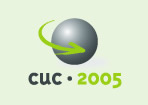Using FLOSS in distance education
Mihaela Banek-Zorica, Jasmin Klindzić,
Faculty of philosophy, Croatia
Abstract:
The workshop "Using FLOSS in distance education"
(FLOSS being Free/Libre and Open Source Software) would cover a topic
of using different FLOSS software solutions in distance education based
on author's experience in the field. Both authors were involved in the
planning, selection and implementation process of distance education system
on the Faculty of philosophy, University of Zagreb.
During the process of selection, the most suitable product
for our needs turned out to be a FLOSS project called MOODLE (Modular
Object-Oriented Dynamic Learning Environment) because of its modular concept
and possibility of customization and localization. Also, during the early
stage of implementation, we were faced with a problem of production and
conversion of existing educational material into more suitable, digital
form that is SCORM compliant (Sharable Content Object Reference Model),
thus enabling shareable and reusable content that is future-proof (and
independent from the platform used to serve the educational content).
We have also found that online collaboration during the content creation
process between the teachers (and other participants in the educational
process) is necessary for succesful transfer of knowledge. The best solution
for that problem was the use of Edukalibre Moodle Collab software, developed
in the international project funded by the European Comission under the
Socrates/Minerva program. Edukalibre project research is based on sharing
and reusing software components that can flexibly be adapted to a variety
of web-based educational paradigms.
During this early stage (about 12 months), the number
of teachers and students involved in our project (that is, using the system
for educational purposes) has arisen to 1100+, with more than 70 courses
developed and 3 GB of teaching material produced, as a result enabling
us to gain broader view of the issues that need to be solved when planning
and implementing distance education system in higher education institution.
Since our faculty has more than 5000 students and over 2500 offline courses,
we expect a greater use with the beginning of the academic year 2005/2006.
During the workshop the authors will try to explain the
use of MOODLE system combined with the Edukalibre Moodle Collab software
on real-life case-study, that is, they (and other workshop participants
as well) will develop a new course using the abovementioned tools/software.
The participants will learn how to use different MOODLE modules: assignment,
glossary, quiz, SCORM import, forum and others. They will also learn how
to import/export educational material to and from MOODLE. Special attention
will be given to the reusability of information resources within MOODLE.
The participants will also be able to test the Edukalibre software features
such as version control of the documents, automatic conversion to different
formats, document online editing. The participants will be given credentials
(user name and password with the appropriate rights for creation of test
courses) for the MOODLE installed on our testing server which will be
operational for 6 months AFTER the workshop, so they can use it to further
evaluate both MOODLE and Edukalibre software. The participants will also
be given some guidelines on what hardware and software platform, as well
as infrastructure is needed for support of the distance education system
on such a large scale.
Biography
Mihaela Banek Zorica is a research and teaching
assistant at the Department of Information Sciences, Faculty of Philosophy,
University of Zagreb, Croatia.
She is currently enrolled in a PhD study at the department of information
science. Her doctoral thesis research is in the field of knowledge organization
and education in electronic environment. She is co-author of one book
and several scientific papers in the field of information sciences.
Jasmin Klindžić is a system-administrator at Faculty
of Philosophy in Zagreb. Main fields of his work are web development and
education (with special focus on e-learning solutions). Since 1995, he
has taught numerous courses and seminars on both computer and Internet
literacy to Croatian college students. He is one of the authors of CARNet's
offical learning material. He is also active on PR position in design
studio SB NET from Slavonski Brod.
|






